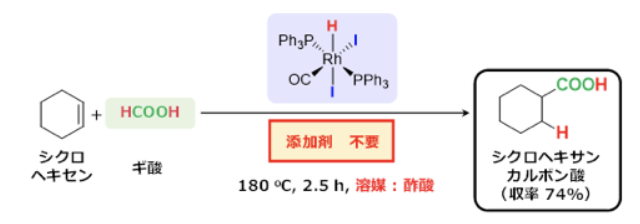Formic acid can be prepared through hydrogenation of CO2. The hydroxycarbonylation reaction of alkenes using formic acid has conventionally been catalyzed by a rhodium complex, Rh2Cl2(CO)4, and additives, triphenylphosphine (PPh3) and methyl iodide (CH3I), which have high environmental impact and toxicity, and p-toluenesulfonic acid hydrate (p-TsOH, H2O), which promotes the decomposition of formic acid. Under a contract from NEDO, the company has developed an improved catalyst, RhHI2(CO)(PPh3)2 in acetic acid, a safe and environmentally friendly for the synthesis of carboxylic acids in acetic acid as solvent. As a model reaction, ydroxycarbonylation of cyclohexene was studied.
NEDO news release, June 18, 2021

